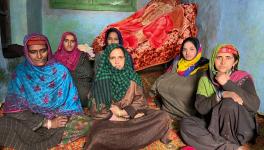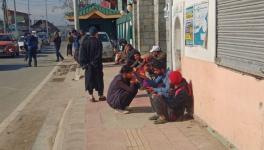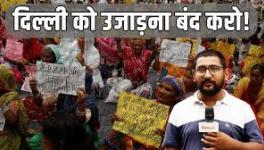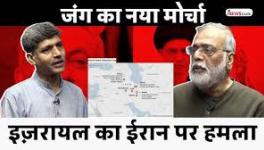'Now We Want the Chair': Kashmir’s Women SHG Leaders Gear up for Panchayat Polls
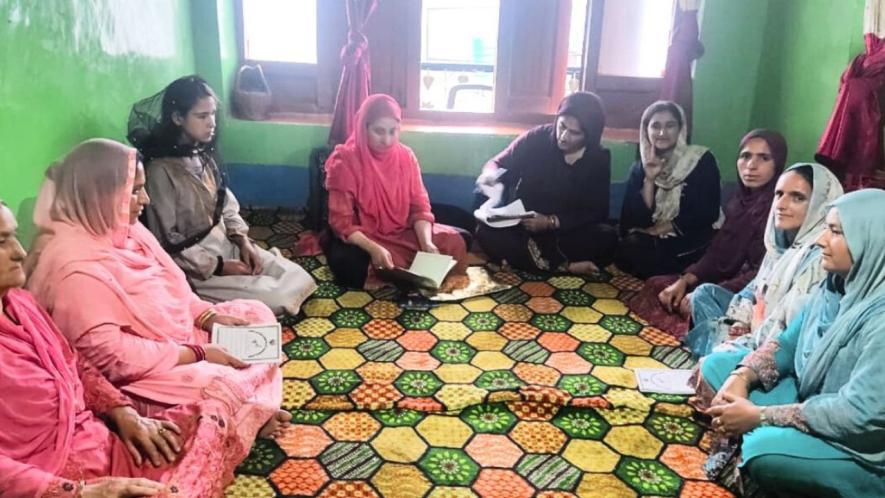
Shamshada Bano with her SHG which has become a space for informal leadership and collective empowerment (Photo by Arsalan Bhukari, 101Reporters)
Baramulla, Jammu and Kashmir: In a quiet corner of Kreeri village in North Kashmir’s Baramulla district, Rubeena Begum (40) walks across muddy paths, knocking gently on wooden gates. A local self-help group (SHG) leader, she greets her neighbours by name, reminds them about the pipeline they lobbied for last year, and makes a request, “Iss baar vote mujhe do [vote for me this time].”
Rubeena has been leading an SHG for the past ten years. And now, she is trying to fight a panchayat election. She believes her grassroots-level work experience has prepared her for politics in ways formal education or party training never could.
Rubeena’s SHG started with women pooling small savings to support each other and gain access to government schemes. “But what we really built was courage,” she told 101Reporters. “I never thought I could speak in a room full of officers. Now, I can argue with a bank manager, a block officer, or even the sarpanch.”
Another SHG leader, Shamshada Bano (39), plans to contest. “Our women have been quietly doing the work of a panchayat for years,” she said. “Now we’re just asking for the chair.”
Her journey with SHGs began after her husband’s job as a driver became irregular. With a loan of ₹20,000 from the group, she started a small dairy business. Over the years, she found herself going to government offices to apply for subsidies, coordinate veterinary visits, and help other women apply for ration cards.
“I didn’t even know how to write an application before,” she said. “Now I’ve written 50. We’ve filed RTIs, gone to grievance cells, even shouted slogans when we had to. That’s where I learned politics — not in a party, but in line at the tehsildar’s office,” she said.
The struggle for political participation
Through the years, the SHG women became the go-to people in their villages — the ones who knew how to write an application, find out why an old-age pension was delayed, or get a gas connection.
Abid Hussain, a schoolteacher in Kreeri, said he has more faith in SHG women than in most elected Panchayat officials. “They’ve fixed our local health centre, brought back the doctor, got the roads repaired — without being in power,” he said. “If they’ve done all this without being elected, imagine what they’ll do if they win.”
He remembers how the PHC in their village didn't have a doctor for emergencies. Nothing happened despite complaints, and the panchayat wasn't able to resolve the issue, though it fell under their jurisdiction. It was only when the women collectively met the then-Chief Medical Officer that they were finally able to appoint a doctor.
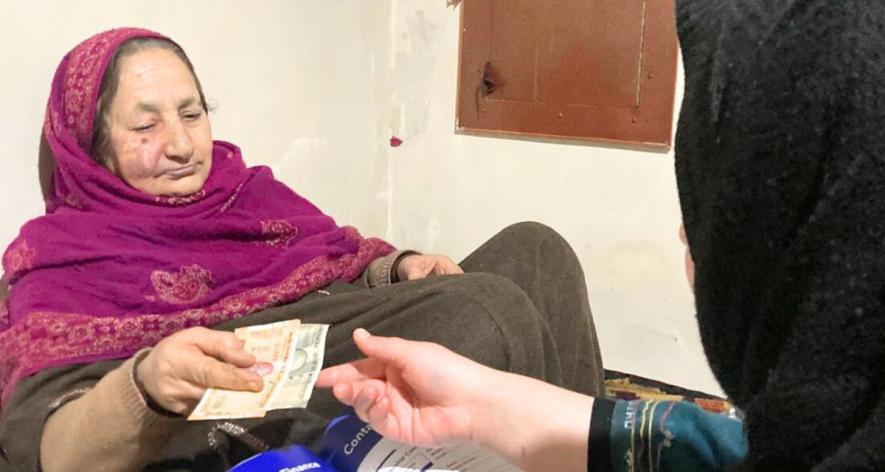
Rubeena helps out one of the women in her village with paperwork (Photo sourced by Arsalan Bhukari, 101Reporters).
Jammu and Kashmir (J&K) has not had a local body election since 2018; even before that, it has been erratic at best. But the recent updation of electoral rolls has raised hopes of a panchayat election happening soon. Meanwhile, not just Rubeena and Shamshada, but many other women they know through SHGs from neighbouring villages are planning to contest, they say.
Many of these women will contest independently, and their campaigns don't come with grand ideological promises like their politically backed opponents. They are asking for a vote based on what they’ve already done — fixed broken pipes, helped set up anganwadi kitchens, and organised protests when schemes were delayed. When Morifat Jehan's (60) frequent visits to the local social welfare office yielded no results in securing her widow pension, it was Rubeena who helped her navigate the multiple formalities.
Former sarpanch Fayaz Ahmad said he has seen Rubeena work closely with officers and villagers for years. “She’s not a 'seasonal' leader,” he said. “She’s been here through floods, protests, COVID. People trust her.”
Despite all this, most political parties remain reluctant to give tickets to SHG leaders, as sifting through a long line of career politicians leaves little window to accommodate women leaders at the grassroots level, admits local political leader of the National Conference, Mir Sameer. Rubeena reflects that they want women like her to campaign for them, but won't give them tickets.
Defiant, Shamshada says that we won't wait for someone to give us a ticket. “We gave ourselves permission."
Leaning, learning and leading
The SHG model in Jammu and Kashmir has exploded over the past decade; there are now more than 70,000 SHGs across the union territory. Thousands of women meet every week to save money, run small businesses, and access government support. But beyond livelihood generation, these groups have become spaces of informal leadership and collective empowerment, particularly in conflict-affected areas where women’s visibility in public life has been traditionally low.
“When you go together as a group, you’re not scared,” said Dilshada Jan, an SHG member who has become Rubeena’s campaign manager. “Government officers used to dismiss us at first. Now they listen. We’ve learned their language—schemes, forms, funds, deadlines.”
Firdous Ahmad, who works with the Kashmir Livelihood Foundation, echoed her, saying SHGs are forcing a shift in how government officials engage with women. “Earlier, women were treated as passive beneficiaries. Now they’re active negotiators,” he said. “They’re setting new terms for governance.”
Experts say this collective approach could fundamentally reshape grassroots politics. Dr. Bilal Saeed, a political sociologist at the University of Kashmir who has studied local governance and gender participation in rural J&K, said the shift from self-help groups to political participation is particularly significant in the region.
“Kashmir is a highly patriarchal society, and because of the prolonged conflict and lack of exposure for women, political participation from SHG platforms was not something we had seen before. So when women here begin stepping into leadership— not with slogans, but with spreadsheets, application copies, complaint numbers —it marks a real shift,” he said. He notes that what's perhaps more surprising is that this is happening despite the lack of strong institutional backing.
‘A woman can stand for election. That itself is change’
As elections approach, the campaign in these villages remains quiet — no big rallies, no party offices. Just a group of women walking together, house-to-house, with files in hand, collecting phone numbers and encouraging women to get enrolled as voters.
For Rubeena and Shamshada, even contesting the election feels like a form of victory. “Maybe I’ll win, maybe I won’t,” said Rubeena. “But now, every girl in my village knows a woman can stand for election. That itself is change.”
Her daughter, Mehak (16), says she used to think politics was only for men with big cars and loud voices. “But now I see my mother do more work than any politician. I want to be like her,” she said.
Rubeena is well aware of what she is up against. Adjusting her headscarf, she said, “First of all, the local political parties… They have strong networks already in place… When elections come, they just activate that network — those people go door-to-door, convince voters, mobilise entire families.”

Defiant, Shamshada says that we won't wait for someone to give us a ticket. “We gave ourselves permission._ (Photo - Arsalana Bhukari, 101Reporters).
Both women say their families were initially hesitant. “My husband said politics is a dirty game,” said Shamshada. “But now, when he sees people coming to me for help, he understands. This isn’t about power. It’s about responsibility.”
Tajamul Bano, a former ward member from Qazipora, said she’s watched SHG women handle village issues with more consistency than many elected representatives. “We often get caught in party politics or wait for approvals. But these women don’t wait — they follow up on school repairs, water pipelines, even ration cards,” she said. “Still, politics means power struggles. I worry how much space would be given to them once they win.”
Echoing this, Rubeena said the bigger challenge lies in breaking gender barriers, recounting how people in her village grieved when Mehbooba Mufti was elected as the first woman Chief Minister of Jammu and Kashmir. “That tells you something about how deep these biases still run,” she said. “We live in a place where people still hesitate to trust women with leadership.”
Arsalan Bukhari is a freelance journalist and a member of 101Reporters, a pan-India network of grassroots reporters.
Get the latest reports & analysis with people's perspective on Protests, movements & deep analytical videos, discussions of the current affairs in your Telegram app. Subscribe to NewsClick's Telegram channel & get Real-Time updates on stories, as they get published on our website.












